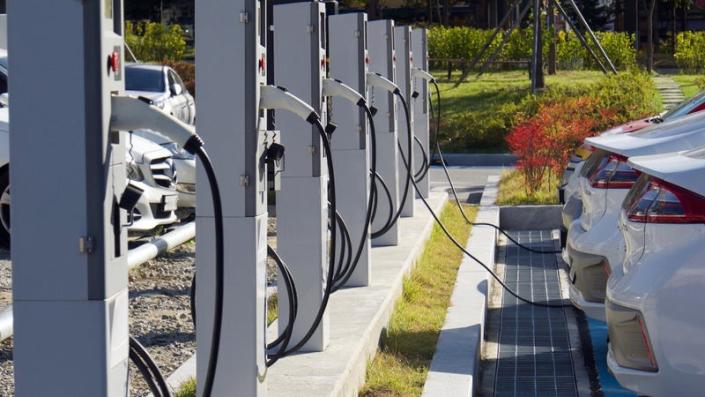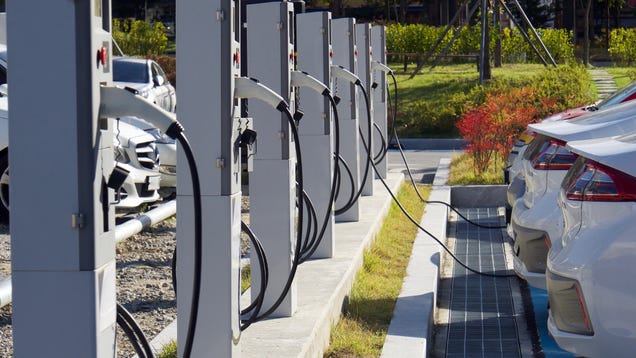
EV drivers in Texas don’t pay at the pump, but will have to start paying a significant annual fee that critics are calling “punitive.”
Driving an electric vehicle in Texas is soon to become more expensive. Governor Greg Abbott signed a law (SB 505) on May 13 instituting new fees for registering and owning EVs in the state. Under the bill, electric car owners will have to pay $400 upon registering their vehicle. Then, every subsequent year, EV drivers will have to shell out an additional $200. Both of those fees are on top of the cost of the standard annual registration renewal fees, which are $50.75 each year for most passenger cars and trucks.
The law exempts mopeds, motorcycles, and other non-car EVs, and goes into effect starting on September 1, 2023.
Read more
At least 32 states currently have special electric vehicle registration fees, according to data from the National Conference of State Legislatures. These range from $50 in places like Colorado, Hawaii, and South Dakota to $274 (starting in 2028) in a recently passed piece of Tennessee legislation. Note: Tennessee lawmakers had originally proposed a $300 fee, but lowered it in response to pushback.
Like many other states that have instituted EV fees, the reasoning behind the Lone Star State’s new law is that electric car drivers don’t buy gas. Taxes at the fuel pump are the primary way that most states, Texas included, amass funds for road construction, maintenance, and other driving-related infrastructure.
“Currently, Texas uses the gasoline/diesel fuel tax to fund transportation projects; however, with the growing use of EVs, the revenue from the fuel tax is decreasing, which diminishes our ability to fund road improvements for all drivers,” said the bill’s author, Republican State Senator Robert Nichols, in comments about the legislation, per local NBC News affiliate KXAN.
But, compared with what gas drivers contribute, Texas’s EV fees seem a little out of whack. Charging $200 per year and $400 at the outset of EV ownership places Texas’s fee schedule at the higher price end of the policies out there. In comparison, Texas’s gas tax is among the lowest in the country, at just $0.20 per gallon. Just seven states impose a lower duty on gasoline than TX. Among the 10 most populous states in the country, additional fees levied elsewhere make Texas’s gas the cheapest.
The average Texas driver burned through ~55 million BTUs of motor gasoline in 2018, according to data from the U.S. Energy Information Administration. That’s equal to about 440 gallons of gas. At $0.20 per gallon, the standard car owner in Texas is paying just $88 per year in gas taxes—far less than the hundreds more EV drivers will now be throwing into the pot. A 2022 Consumer Reports analysis determined that a Texas driver’s gas tax contribution is even lower, at just $71.
The new law says loud and clear that Texas is “fully behind oil and gas,” Kara Kockleman, a transportation engineering professor at the University of Texas, Austin, told local ABC News affiliate KVUE. “Electric vehicles should pay a gas tax – I just think the tax on the conventional cars should be much, much higher than it is. We pay less for gas in this state than almost anyone in the world… Texas is really behind the curve on trying to do the right thing by the environment. And so, that’s embarrassing, I think, for all of us.”
There’s no doubt that roads and other car infrastructure are expensive. Though it can be easy to forget that—every time a driver cruises down the asphalt, complies with a traffic signal, or reads a highway sign—they’re benefiting from a costly system constructed for their particular use and benefit. But compared with other forms of transportation in the U.S., car ownership is already heavily subsidized. So is burning fossil fuels.
According to a 2015 analysis from the nonprofit Canadian media outlet The Discourse, society pays more than $9 for every $1 a driver pays in commuting: Through infrastructure, accident liability, noise and air pollution, and congestion. Buses, biking, and walking all eat up much less public funds for the same amount of miles traveled. EVs presumably also have a slightly lower public cost, as they’re quieter and don’t directly emit air pollution.
Yet in Texas, the tax load for driving an electric car will far exceed that of a gas-powered vehicle. The new law is “punitive” according to Consumer Reports. “Consumers should not be punished for choosing a cleaner, greener car that saves them money on fuel and maintenance,” Dylan Jaff, a policy analyst at CR, wrote in an April statement. “The fees proposed in this bill will establish an inequitable fee scale for EV owners, and will not provide a viable solution to the long-standing issue of road funding revenue.”
Luke Metzger, director of the non-profit advocacy group, Environment Texas, echoed Consumer Reports’ findings in a statement from last month. “The Texas Legislature is pouring sugar in the tank of the electric vehicle revolution. This punitive fee will make it harder for Texans to afford these clean vehicles which are so critical to reducing air pollution in Texas.”
Electric personal vehicles are not a perfect solution to the ongoing problem of petroleum-powered cars. Swapping every gas-guzzler for an EV still would use up an extraordinary amount of resources, that are likely to be ill-gotten. Public investment in mass transit would inarguably be a better environmental strategy. But, as long as the U.S. remains overwhelmingly car dominant and as long as most Americans lack access to adequate public transit, EV uptake remains important for lowering the nation’s carbon emissions.
Already, the upfront costs of purchasing an electric car are significantly higher than buying a gas vehicle. A disproportionate tax system adds to that burden, and it could dissuade people from transitioning to EVs.
More from Gizmodo
Sign up for Gizmodo’s Newsletter. For the latest news, Facebook, Twitter and Instagram.
[ad_2]
Source link







